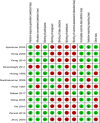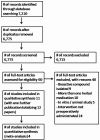Herbal medications for anxiety, depression, pain, nausea and vomiting related to preoperative surgical patients: a systematic review and meta-analysis of randomised controlled trials
- PMID: 31129571
- PMCID: PMC6538060
- DOI: 10.1136/bmjopen-2018-023729
Herbal medications for anxiety, depression, pain, nausea and vomiting related to preoperative surgical patients: a systematic review and meta-analysis of randomised controlled trials
Abstract
Objective: To summarise the effects of herbal medications for the prevention of anxiety, depression, pain, and postoperative nausea and vomiting (PONV) in patients undergoing laparoscopic, obstetrical/gynaecological or cardiovascular surgical procedures.
Methods: Searches of MEDLINE, EMBASE, Cochrane Central Register of Controlled Trials and LILACS up until January 2018 were performed to identify randomised controlled trials (RCTs). We included RCTs or quasi-RCTs evaluating any herbal medication among adults undergoing laparoscopic, obstetrical/gynaecological or cardiovascular surgeries. The primary outcomes were anxiety, depression, pain and PONV. We used the Grading of Recommendations Assessment, Development and Evaluation approach to rate overall certainty of the evidence for each outcome.
Results: Eleven trials including 693 patients were eligible. Results from three RCTs suggested a statistically significant reduction in vomiting (relative risk/risk ratio (RR) 0.57; 95% CI 0.38 to 0.86) and nausea (RR 0.69; 95% CI 0.50 to 0.96) with the use of Zingiber officinale (ginger) compared with placebo in both laparoscopic and obstetrical/gynaecological surgeries. Results suggested a non-statistically significantly reduction in the need for rescue medication for pain (RR 0.52; 95% CI 0.13 to 2.13) with Rosa damascena (damask rose) and ginger compared with placebo in laparoscopic and obstetrical/gynaecological surgery. None of the included studies reported on adverse events (AEs).
Conclusions: There is very low-certainty evidence regarding the efficacy of both Zingiber officinale and Rosa damascena in reducing vomiting (200 fewer cases per 1000; 288 fewer to 205 fewer), nausea (207 fewer cases per 1000; 333 fewer to 27 fewer) and the need for rescue medication for pain (666 fewer cases per 1000; 580 fewer to 752 more) in patients undergoing either laparoscopic or obstetrical/gynaecological surgeries. Among our eligible studies, there was no reported evidence on AEs.
Prospero registration number: CRD42016042838.
Keywords: GRADE; cardiovascular surgery; gynecologic surgery; herbal, laparoscopy; obstetrical surgery; systematic review.
© Author(s) (or their employer(s)) 2019. Re-use permitted under CC BY-NC. No commercial re-use. See rights and permissions. Published by BMJ.
Conflict of interest statement
Competing interests: None declared.
Figures





References
Publication types
MeSH terms
Substances
LinkOut - more resources
Full Text Sources
Medical
